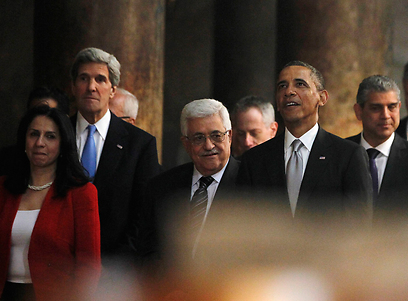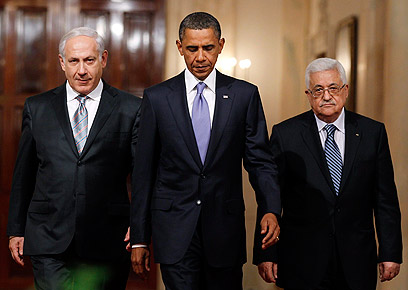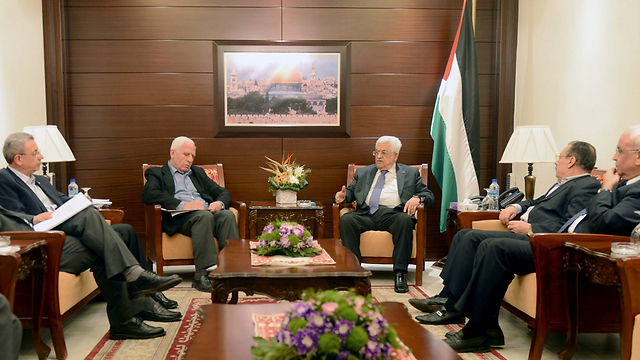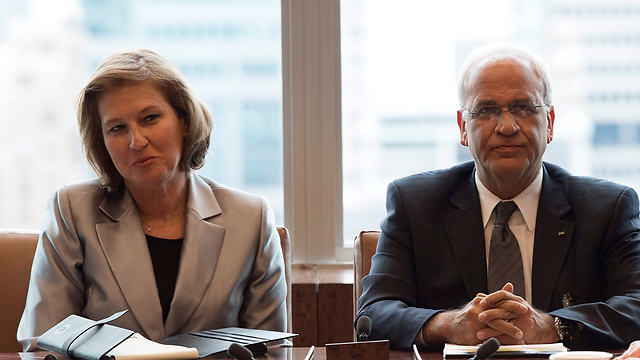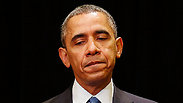
"The timing was troubling and we were certainly disappointed in the announcement," State Department spokeswoman Jen Psaki told a regular news briefing. "This could seriously complicate our efforts. Not just our efforts but the efforts of the parties to extend their negotiations."
Related stories:
Psaki said US officials had expressed their concerns to the Palestinians. "It's hard to see how Israel can be expected to negotiate with a government that does not believe in its right to exist," she said.
The Palestinian move, coming after a long line of failed efforts to reconcile after seven years of internal bickering, envisions a unity government within five weeks and national elections six months later.
Israel said after the announcement that Abbas had chosen Hamas over peace, and canceled a session of US-brokered talks with the Palestinians that had been scheduled for Wednesday night in Jerusalem.
Netanyahu slammed the Hamas-Fatah agreement and said: "Abu Mazen (Abbas) could have chosen peace with Israel instead of peace with a murderous terror organization. Tonight, while talks are ongoing to extend peace talks, he chose Hamas… He who chooses Hamas does not want peace."
Netanyahu told Channel 2 he would convene an emergency session of his security cabinet on Thursday to discuss his response.
Abbas for his part claimed the deal did not contradict the talks: "There is no incompatibility between reconciliation and negotiations, especially as we are committed to a just peace based on a two-state solution in accordance with resolutions of international law," Abbas said in an official statement distributed by his office.
"In the interest of the Palestinian people, it is necessary to preserve the unity of land and people," Abbas said, claiming it "help to strengthen the establishment of an independent Palestinian state with East Jerusalem as its capital. This approach, supported on the Arab and international levels, strengthen the capacity of Palestinian negotiators to achieve the two-state solution."
However, Justice Minister and Chief Israeli peace negotiator Tzipi Livni seemed to disagree, calling the agreement a "very problematic development which harms peace talks."
According to Livni, "in light of the new situation, Israel must examine its implications, and consider its next steps accordingly."
Along with the United States and the European Union, Israel views Hamas as a terrorist organization, and says Abbas' efforts to unify with the group show he is not serious about extending the troubled negotiations.
Bayit Yehudi Chairman Naftali Bennett slammed the unity agreement between Hamas and Fatah, which also includes Islamic Jihad, saying: "The Palestinian Authority has become the world's largest terror organization; we have entered a new political era in the Mideast."
Bennett further added "much like the US does not talk with al-Qaeda, Israel must make clear that it does not talk with killers."
However, Opposition and Labor party Chairman Isaac Herzog slamed the prime minister, saying the Palestinian unity agreement "was a result of Prime Minister Benjamin Netanyahu's lack of political initiative."
However, Herzog added that "the burden of proof regarding the implications of the agreement lies on President Abbas"
Meretz Chairwoman Zehava Galon echoed the claims and slammed the government for the situation: "Netanyahu pushed President Abbas into Hamas' arms and now he is asking him to choose between Israel and Hamas. This is an unreasonable demand which contradicts the Israeli interest."
According to Galon the agreement is essential "as long as Hamas is committed to the future agreement with Israel."
Soon after the unity deal was announced, Israel Air Force jets fired on a suspected Palestinian terrorist he rode his motorcycle in the northern Gaza Strip, however they missed their target and wounded at least 12 bystanders in Gaza.
Shortly after the strike, the "color red" alert for incoming rockets from Gaza sounded in Israeli communities in the southern Hof Ashkelon and Sha'ar Hanegev regions with three rockets being fired, but failing to land in Israel.
The talks, aimed at ending its decades-old conflict with the Palestinians and establishing a Palestinian state in the West Bank and Gaza, are scheduled to end on April 29.
Attila Somfalvi, Elior Levy and the Associated Press contributed to the report














